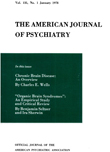Abstract
On admission to the sick list, 3 brothers presented the picture of an anxiety reaction. Their symptoms were similar, but varied in intensity. The opportunity to observe a reaction so common in wartime in individuals with very much the same protoplasmic posisibilities and environmental background, seemed unique.
Upon study, it is seen that the brothers illustrate three types of neurotic disability seen frequently in this war. It would appear that their common symptom, anxiety, stems from their common inheritance and back-ground. The individual course and prognosis of that anxiety would likewise seem to depend on personal differences which are somewhat less apparent.
I. M. had already displayed symptoms of emotional maladjustment during childhood, adolescence and adulthood prior to service. His combat experience in 3 invasions was severe, but somewhat less so than that of his brothers. Anxiety symptoms reached severe proportions rather rapidly. His old neurotic pattern was revealed in the Rorschach, Minnesota and Thematic Apperception tests. During the treatment period of several months, he responded slowly but definitely, retaining his anxiety longer than C., but releasing it more rapidly than R. He now (3-14-45) reveals only a slight increase over his pre-enlistment anxiety. His combat experiences have only colored to some extent an otherwise drab, neurotic personality.
II. C., during childhood and adolescence, had been somnambulistic, stammered, chewed his nails, and been quick tempered. On enlistment, however, no neurotic symptoms had been apparent for several years. His anxiety had increased along with that of his brothers, until his fortunate (?) wounding by shrapnel, which removed him from almost the entire Guam campaign. Projective tests confirmed the impression that he was the least neurotic of the 3. Under treatment, he responded rapidly and in a few weeks his anxiety was dispelled.
III. Prior to service, R. had demonstrated the least evidence of neurotic reaction. There was suggestion of maternal rejection, however, and he stated that he was "rather quick-tempered," and had been a nail biter since age 10. He experienced the most severe combat and displayed the most marked anxiety. A temporary solution to his unbearable anxiety took the form of an amnesic episode, probably hysterical in nature. After treatment over a period of 4 months, moderate anxiety persists. His outlook for the future remains a matter for conjecture; Rorschach and Minnesota performance suggest the potentiality of its developing into a more fixed neurosis.

